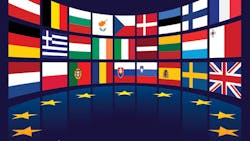EU Seals Trade Pact with African Nations after 12 Years of Talks
The European Union and six southern African nations will sign off on a trade accord on June 10 after 12 years of negotiations that were stalled mainly by differences over market access for agricultural products.
The so-called Economic Partnership Agreements gives products from Botswana, Lesotho, Mozambique, Namibia, and Swaziland duty- and quota-free access to the EU. South Africa, which has the region’s most-developed economy, will enjoy enhanced market access that goes beyond an existing preferential trade pact. The new accord is open-ended and will be reviewed every five years.
Despite the delays, the fact that some EU economies were struggling and the uncertainty of the U. K. leaving the EU, the deal is the most favorable yet clinched by the African nations, EU Trade Commissioner Cecilia Malmstrom said.
“It opens up fully the EU market for all goods and commodities on an asymmetric basis,” she said on June 8 in Gaborone, Botswana’s capital. “It contains safeguards for vulnerable sectors and is a long-term cooperation on economic development. More trade is better but ours is the most advantageous” deal, she said.
In June last year, the U.S. renewed its African Growth and Opportunity Act. First adopted in 2000, the pact eliminated import levies on more than 7,000 products from Africa, ranging from textiles to manufactured items. That accord benefits 39 nations.
The African nations signing the pact with the EU will gain access to its 100-million-euro fund ($134 million) fund for economic integration and a 32-million-euro trade-related facility, Malmstrom said. The funds were set up to help countries fully benefit from the concessions offered by the EU by boosting their productive capacity and improving the quality of their exports.
About the Author
Agence France-Presse
Copyright Agence France-Presse, 2002-2025. AFP text, photos, graphics and logos shall not be reproduced, published, broadcast, rewritten for broadcast or publication or redistributed directly or indirectly in any medium. AFP shall not be held liable for any delays, inaccuracies, errors or omissions in any AFP content, or for any actions taken in consequence.
